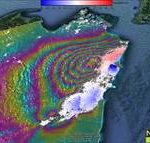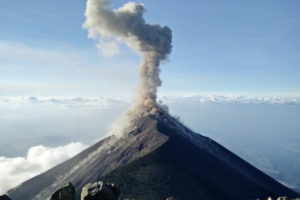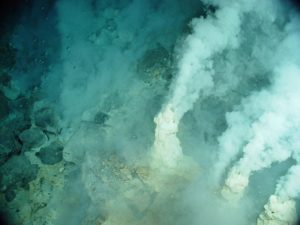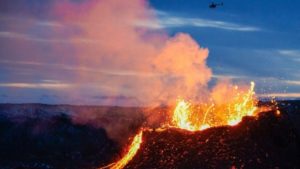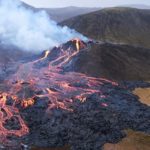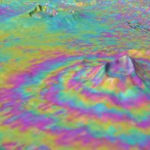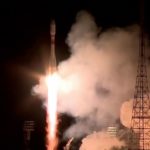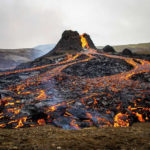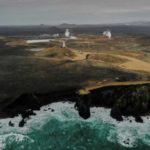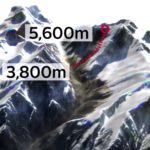COMET has a significant presence in the media, whether it’s expertise provided by our scientists or news about COMET itself. You can read a selection of recent media coverage below.
The endless fascination of volcanoes
11th May, 2024 • The Spectator
‘Volcanoes, volcanoes, volcanoes. You wait years for a good book or a film about volcanoes to come along and then they blow up all at once’: A review of COMET Scientist, Professor Tamsin Mather’s (Oxford) new book, entitled ‘Adventures in Volcanoland: What Volcanoes Tell us About the World and Ourselves’ in The Spectator.
Adventures in Volcanoland by Tamsin Mather review – fire and brimstone
17th April, 2024 • The Guardian
A review of Professor Tamsin Mather’s (Oxford) new book ‘Adventures in Volcanoland’ in The Guardian.
Why is a volcano in Antarctica spewing out gold dust?
12th April, 2024 • Metro, The Independent Singapore
Professor Tamsin Mather (Oxford) contributes to an article explaining why a volcano in Antarctica is spewing out gold dust and whether it could lead to riches.
Uncovering Earthquake Evidence in Azerbaijan’s Greater Caucasus Mountains
27th March, 2024 • EOS
A new study by Dr Ian Pierce et al. unearths geological evidence that corroborates historical accounts of large earthquakes along the Kura fold-thrust belt.
The Greek island of Santorini is hiding an explosive secret
26th March, 2024 • National Geographic
COMET Scientist Professor David Pyle (Oxford) is quoted in the article.
Iceland Volcanic Interview18th March, 2024 • BBC BreakfastCOMET Scientist Professor Mike Burton (Manchester) discusses the latest volcanic eruption near Grindavik.
Mercury Rising: Study sheds new light on ancient volcanoes’ environmental impact
1st March, 2024 • University of Oxford
COMET Scientist Professor Tamsin Mather (Oxford) co-author’s paper on Early Jurassic large igneous province carbon emissions constrained by sedimentary mercury.
Iceland Volcanic Activities: Experts Believe Could Last For Decades12th February, 2024 • Nature World NewsCOMET Scientist Professor Tamsin Mather (Oxford) and COMET Associate Dr Evgenia Ilyinskaya (Leeds) provide comments in the article.
Featured also in: Futurism
Is Iceland entering a new volcanic era?10th February, 2024 • BBC News (Online) With a series of fissures opening up over the last couple of months, Iceland could be entering a period of increased volcanic activity. COMET Associate Dr Evgenia Ilyinskaya (Leeds) and COMET Scientist Professor Tamsin Mather (Oxford) are quoted.
Iceland Volcano9th February, 2024 • BBC One, BBC News at Six, BBC News (Online)COMET Associate Dr Evgenia Ilyinskaya (Leeds) discusses the latest developments with the volcanic eruption in Iceland, including how it is affecting the town of Grindavik.
This Iceland volcano system has erupted again. And again. Is this normal?
8th February, 2024 • Washington Post
COMET Scientist Professor David Pyle (Oxford) provides comments on the third volcanic eruption in Iceland since December 2023 and disruption caused.
Lightning during volcanic eruptions may have sparked life on Earth
5th February, 2024 • New Scientist
COMET Scientist Professor Tamsin Mather (Oxford) provides a quote on an article contemplating whether lightening strikes during volcanic eruptions could have provided nitrogen in a form that was needed by early life forms.
Why Can’t We Predict Earthquakes?
1st February, 2024 • Why Podcast
COMET Director Professor Tim Wright (Leeds) shares the secrets of Earth’s shifting tectonic plates with Emma Kennedy on Why? Podcast
Volcanic Eruption Iceland – COMET Comments
18th January, 2024 • BBC Radio 4 Inside ScienceCOMET Associate Dr Evgenia Ilyinskaya and COMET Scientist Professor Andy Hooper (both Leeds) talk about new technological advancements in monitoring volcanic activity, and ask the crucial question: are we entering a new millennium of volcanic activity in Iceland?
18th January, 2024 • National Geographic
COMET Scientist Professor Mike Burton (Manchester) provides his expertise in article ‘Iceland’s latest eruption is quieting down—but the explosive upheaval isn’t over yet’.
16th January, 2024 • BBC 1 News Broadcast
COMET Scientist Professor Tamsin Mather (Oxford) appeared on BBC News discussing the volcanic eruption in Iceland.
16th January, 2024 • Live Science
COMET Scientist Professor David Pyle (Oxford) provides quotes in article titled ‘Iceland volcano could erupt again ‘without warning’ as magma still moving beneath Grindavík’.
15th January, 2024 • BBC Breakfast BroadcastCOMET Associate, Dr Evgenia Ilyinskaya (Leeds) is interviewed on recent news that houses have been set on fire in the Icelandic town of Grindavik after two volcanic fissures opened nearby. A volcano on the Reykjanes peninsula erupted in the early hours of Sunday, spilling lava into the fishing town.
15th January, 2024 • Newsweek
COMET Scientist Professor Andy Hooper (Leeds) is quoted in article on ‘Iceland Volcano Update as Lava Hits Town of Grindavík’.
12th January, 2024 • Newsweek
COMET Scientist Professor David Pyle (Oxford) is quoted in article titled ‘Iceland Volcano Could Bring ‘Boundless’ Power’.
Satellite Data and Geophysics
8th January, 2024 • Space Race
In a 20 minute interview with Space Race, COMET Scientist, Professor Richard Walker (Oxford) talks about our work on large earthquakes and active faults in Central Asia, tectonic geomorphology, our use of satellite data, DEMs, and much more.
Japan Earthquake – COMET Comments
2nd January, 2024 • BBC Radio 4
COMET Emeritus Professor James Jackson (Cambridge) speaks to Radio 4’s PM programme.
5th January, 2024 • The Naked Scientist
Interview with COMET Emeritus Professor James Jackson (Cambridge) tackling the questions – What caused it, and what can Japan learn from it?
Embedding equity, diversity and inclusion in our research culture
6th November, 2023 • University of Leeds
In the first of a new feature series highlighting the outstanding work already underway to improve the research culture at Leeds, COMET scientist Dr Sam Wimpenny, a former Research Fellow in the School of Earth and Environment, University of Leeds, reveals how a project he’s leading is helping embed equity, diversity and inclusion (EDI) principles across the University’s research practices.
Iceland Volcanic Activity:
12th November, 2023 • BBC News channelIceland is facing the prospect of an imminent volcanic eruption. Residents of a fishing town left their homes on Saturday after civil defence authorities declared a state of emergency in the region. COMET associate Dr Evgenia Ilyinskaya (University of Leeds) was interviewed.Also in: The Independent | Asharq Al-Awsat (Turkey)
13th November, 2023 • National Geographic
COMET scientist Professor Mike Burton (University of Manchester) features in the article ‘Startling volcanic activity has town in Iceland bracing for crisis’.
13th November, 2023 • The National
A volcanic eruption near Iceland’s capital Reykjavik is unlikely to result in the major disruption to air travel that occurred in 2010, according to experts. COMET Scientist Professor David Pyle (University of Oxford) provides comments.
14th November, 2023 • The Conversation
COMET scientists Professor David Pyle and Professor Tamsin Mather (University of Oxford) write an article exploring the possibility of an imminent volcanic eruption in Iceland.
14th November, 2023 • Financial NewsSomewhere beneath the small Icelandic coastal town of Grindavik, a river of molten rock is on the move. A series of earthquakes over the past three weeks, plus satellite images showing the ground changing shape, have stoked fears that a nearby volcano is about to erupt. Dr Evgenia Ilyinskaya (University of Leeds) told the Financial Times that seismic activity is waning.
14th November, 2023 • Metro
Locals of the Icelandic fishing village Grindavík have been given just five minutes to run home and grab their things as the threat of a volcanic eruption looms. COMET Scientist Professor Matt Watson (University of Bristol) provides comments.
16th November, 2023 • BBC Sounds
COMET Associate Dr Evgenia Ilyinskaya (University of Leeds) talks about how scientists are monitoring Fagradalsfjall volcano and keeping people safe.
16th November, 2023 • WIRED (USA)Iceland’s Reykjanes Peninsula sits atop a vast sheet of magma simmering just half a mile belowground and scientist do not know when or where exactly the eruption will happen. Dr Evgenia Ilyinskaya (University of Leeds) is quoted.
19th November, 2023 • Greatest Hits Leeds COMET Scientist Professor Andy Hooper (University of Leeds) discusses how the eruption of the Icelandic volcano is expected to happen.
21st November, 2023 • NewsweekA “rapid, ongoing” rise in the Earth’s crust is occurring “considerably faster than before” underneath a part of Iceland that has seen heightened tectonic activity in recent weeks, the nation’s meteorological office has said, prompting concerns of an imminent volcanic eruption. COMET Scientist Professor Andy Hooper (University of Leeds) is quoted.
22nd Nov, 2023 • Newsweek Authorities in Iceland are building earth walls around the town of Grindavik and a nearby power station to divert lava flows if a much-anticipated eruption occurs. COMET Scientist Professor Andy Hooper (University of Leeds) is quoted.
Earthquake in Cornwall
19th November, 2023 • LBC News Dr Laura Gregory (COMET Scientist, University of Leeds) discusses the 2.7-magnitude earthquake recorded in Cornwall on Sunday.
2023 Türkiye earthquakes
Summer 2023 • The Geographer
COMET Scientists Dr Ekbal Hussain and Dr Brian Baptie (BGS) wrote a short article about the 2023 Türkiye earthquakes and their historical context, and discussed some of the impacts to Türkiye & northern Syria for RSGS. The article is now free to read.
Four magnitude-6.3 earthquakes strike in succession near Herat, Afghanistan
31st October, 2023 • Temblor
The recent quadruplet of earthquakes that have rocked Herat, Afghanistan, bring an important question to the fore: how can traditional earthen buildings be strengthened to withstand shaking? Professor Richard Walker (University of Oxford) provides his valuable insight.
A huge volcano near Naples has been convulsing. What does it mean?
20th October, 2023 • National GeographicAlthough experts believe ‘the probability of a volcanic eruption is relatively low,’ the relentless inflation and recent shaking of Italy’s Campi Flegrei caldera raise questions for experts and locals. COMET Scientist Professor Mike Burton (University of Manchester) is quoted throughout the article.
How PurpleAir is Helping Researchers Study Volcanic Pollution
19th October, 2023 • PurpleAirRosie Lewis, a Ph.D. researcher in Volcanology at the University of Leeds, has been working on a field campaign for two years to shed more light on volcanic pollution. Together with Montserrat Volcano Observatory and the Disaster Management and Coordination Agency, Lewis installed 11 low-cost air quality monitors, including PurpleAir, along the Soufrière Hills volcano.
Second Quake in Northwestern Afghanistan
11th October, 2023 • SBS News
COMET Scientist Professor Richard Walker (University of Oxford) is quoted throughout the article describing the impact of the second earthquake in Afghanistan.
Hazard Science
16th September, 2023 • Rangoli Radio
COMET Scientist Dr Ekbal Hussain (BGS) talked about his work in Hazard Science and his own roles models, including COMET Director, Tim Wright and others.
Satellite Data Yields Clues to Morocco’s ‘Blind Earthquake’
12th September, 2023 • The New York TimesData gathered by a satellite 430 miles above earth is offering scientists critical clues to help unravel the mechanics behind the Moroccan earthquake. The satellite relies on radar to measure tiny shifts in the ground toward or away from the orbiting craft, according to COMET Director Professor Tim Wright, (University of Leeds).
Other news articles: Zyri
Morocco: Seismologists Explain Why Quake Was So Deadly
12th September, 2023 • plustv Africa
Professor Richard Walker (University of Oxford) referred to in article on the Morocco earthquake.
Morocco Earthquake Movement Mapped From Space
11th September, 2023 • BBC News, BBC Afrique
Satellites are making rapid maps of Morocco in the aftermath of Friday’s catastrophic magnitude 6.8 earthquake. The information they gather will be vital to responders trying to reach affected towns and villages in the High Atlas mountains. COMET Director Professor Tim Wright (University of Leeds) is quoted.
Other news articles: Lao Dong (Vietnam)
Earth’s newest ‘baby volcano’
25th July, 2023 • BBC Travel
On 10 July, a volcanic eruption near Litli-Hrútur in south-western Iceland saw fissures open up in the Earth – and the creation of a new “baby volcano”. Laura Wainman, a COMET affiliated PhD student at the School of Earth & Environment at the University of Leeds studying the dispersion of environmentally reactive trace elements in volcanic plumes, was on a plane to Iceland “within minutes of the eruption starting”. She is collecting samples from the volcanic plume as part of her research, which focuses on understanding the composition and size distribution of particles within the volcanic plume and how they are transported in the atmosphere.
Airline Passengers Amused As Plane Takes Detour To See Iceland’s Erupting Volcano
20th July, 2023 • Nature World News
Airline passengers were given a once-in-a-lifetime, fantastic view of an erupting volcano in Iceland from above as the pilot took a slight detour.
“When a plane flies through an ash plume, it ingests that ash and it melts. It gets so hot that it actually turns into liquid that collects in the cooler parts of the jet engine. This build-up can block the engine and bring it to a halt. And if the engine fails, the aeroplane starts falling out of the sky,” said Mike Burton, COMET Scientist at the University of Manchester, as reported by Euro News.
University Of Oxford’s Volcanic Research Gets Demonstrated At Royal Society’s Summer Science Exhibition
12th July, 2023 • India Education Diary
The Royal Society’s annual Summer Science Exhibition is one of the most prestigious science public engagement events, having taken place in the heart of central London for more than 200 years.
Exhibit lead David Pyle, COMET Scientist based in Oxford’s Department of Earth Sciences, said: ‘We have created a multi-sensory and hands-on exhibit that will show how people have tried to sense or detect change at restless volcanoes both through observation and measurement; and how scientists use sensing data to understand what is happening underground.’
Supervolcanoes – The Infinate Monkey Cage Podcast
3rd July, 2023 • BBC Radio 4
The Infinite Monkey Cage presenters Brian Cox and Robin Ince are joined by COMET Scientist Professor Tamsin Mather (University of Oxford) alongside Professor Chris Jackson (Jacobs/Imperial College) to find out if supervolcanoes are something to worry about.
Volcanic eruptions: What are the risks to aircraft?
17th April, 2023 • Yahoo News
COMET Scientist, Professor Mike Burton (University of Manchester), talks about the impacts of ashfall deposits following the volcano Shiveluch, on the Russian peninsula of Kamchatka, which caused the largest ashfall in 60 years.
Expert comment: Professor Walker on the Türkiye/Syria earthquake disaster
COMET scientist, Professor Richard Walker (University of Oxford) describes the background to the 6 February 2023 Kahramanmaraş earthquake sequence which has caused widespread destruction both in Türkiye and Syria. (University of Oxford news, 24.02.2023)
The day the Earth moved
COMET data used in article and quotes from COMET director, Professor Tim Wright (University of Leeds). (Reuters, 17.02.2023)
Turkish earthquake, Satellite analysis shows Fault misalignment Use of COMET SAR image and analysis from COMET director, Professor Tim Wright (University of Leeds). (Nikkei Japanese newspaper, 14.02.2023)
What caused the earthquake in Turkey?
Science Interviews: Interview with COMET scientist, Professor James Jackson, University of Cambridge. (The Naked Scientists, 10.02.2023)
Turkey earthquake fault lines mapped from space
COMET director, Professor Tim Wright (University of Leeds) quoted throughout BBC article on COMET’s Sentinel-1A mapping of earthquake faults (3rd most read article on BBC website on 10.02.2023). (BBC News, 10.02.2023)
Turkey earthquake opened 190-mile-long fissure, satellite images show
COMET data used in article and quotes by COMET director, Tim Wright and COMET researcher, Milan Lazecky (University of Leeds) (Space.com, 10.02.2023)
Why is it so hard to predict earthquakes?
COMET director, Professor Tim Wright (University of Leeds) quoted throughout the article. (Aljazeera, 09.02.2023)
COMET scientist, Dr Ekbal Hussain (BGS) provided a radio interview and analysed the devastating impact of the Turkey/Syria Earthquake and shared his knowledge on why earthquakes happen and whether they can be predicted and what happens after an earthquake? (Voice of Islam Radio, 9.02.2023)
COMET director, Professor Tim Wright (University of Leeds) took part in a live panel discussion discussing the impacts of the Turkey-Syria earthquake alongside Kaan Saner, Turkish Red Cresent and Ali Pinar, Seismologist at Bogazici University. (TRT World, 06.02.23)
Landslide risk remains years after even weak earthquake
Satellite observations have revealed that weak seismic ground shaking can trigger powerful landslide acceleration — even several years after a significant earthquake. The research was led by COMET associate Professor Zhenhong Li (Newcastle University). (Mirage, 01.12.2022)
How Mauna Loa Went From a Hot Blob to the Biggest Volcano in the World
COMET scientist, Professor David Pyle (University of Oxford), quoted in article on the history of Mauna Loa. (Newsweek, 30.11.2022)
Mauna Loa eruption: what is happening inside the world’s largest volcano?
Mauna Loa, the world’s largest active volcano, is erupting for the first time since 1984. COMET scientist, Professor Andrew Hooper (University of Leeds) says: “There have been some signs of magma welling up over the past 10 years, but there has been no eruption until now.” (BBC News, 30.11.2022)
Mauna Loa Eruption Map Shows Where Lava Flow Is Heading on Hawaii
COMET scientist, Professor David Pyle (University of Oxford), told Newsweek that lava flows are the main threat from this sort of eruption. “The main hazards from Mauna Loa eruptions are related to lava flows.” (Newsweek, 29.1.22)
When did Mauna Loa last erupt and what happens when it next blows?
COMET scientist, Professor Matt Watson (University of Bristol), told Newsweek there is a line to be crossed between “being prepared” and not being an “alarmist” when it comes to these increases in activity. (Newsweek, 25.10.2022)
US Volcano that has been dormant for 800 years appears to be waking up
COMET scientist, Professor David Pyle (University of Oxford), provides his thoughts on the activity detected under a dormant volcano near Sitka, Alaska. (Nature World News, Newsweek, 27.10.2022)
Multiple factors make Afghan communities vulnerable to earthquakes
COMET scientist, Professor Richard Walker (University of Oxford), contributes to an article explaining Afghanistan’s long-standing vulnerabilities when an earthquake strikes. (Temblor, 10.08.2022)
Iceland eruption may be the start of decades of volcanic activityA second outburst of lava in under a year strongly suggests that the country’s Reykjanes Peninsula will become one of the most volcanically dynamic parts of the planet for several generations. COMET associate, Dr Evgenia Ilyinskaya, University of Leeds : “It’s still early days, but it looks like the eruption will be similar to 2021.” (National Geographic, 04.08.2022)
Understanding Volcanoes
COMET scientist, Prof Tamsin Mather based at the University of Oxford, provides an insight into her research in this 15 minute interview.
(NHK World Japan, Direct talk, 06.07.2022 )
Nepal to move Everest base camp from melting glacier
Dr Scott Watson (COMET researcher) is interviewed about the news that Nepal intends to move a camp at the foot of Everest to a lower altitude because global warming and human activity is making the current position on the Khumbu glacier unstable. He also comments on the story in a variety of other outlets, with the original BBC article (“Everest base camp to be moved from melting glacier”) and others referring to research he co-authored in 2018. (BBC World News and News24, 19.06.2022)
Podcast and interview with COMET scientist, Professor Marie Edmonds talking about implications of her recent paper. (Singing lava helps predict volcanic eruptions, The Naked Scientists, 17.06.22)
Professor Tamsin Mather and Professor David Pyle appear in this new book about volcanoes aimed to increase the disaster resilience of children globally from COPE Champions. (Cope Disaster Champions, 19.05.22) Download free here:
COPE_Volcanoes.pdf (cope-disaster-champions.com)
COMET PhD researcher, Olivia Hogg and Professor John Blundy explain the transition to net zero is creating unprecedented demand for metals and discuss the role for volcanoes as a novel route to a more sustainable future. (Mining the Brine, Geoscientist, 16.05.22)
COMET Director, Tim Wright and COMET Manager, Charlie Royle (University of Leeds) wrote an article on monitoring tectonic processes from space in the latest Geography Review A-Level magazine, available to all secondary schools through a quarterly subscription. (Hodders Magazine, 14.04.22)
COMET scientist, Prof. Mike Burton (University of Manchester) told Xinhua that the volcano in Tonga might go quiet after eruption but that the possibility of further explosions can’t be excluded. ‘Possibility of further volcanic eruptions in Tonga can’t be excluded, says expert.’ (Xinhua, 19.01.22)
COMET scientists Prof. Tamsin Mather and Prof. David Pyle (University of Oxford) provide quotes on the impact of when an underwater volcano erupts in an article titled: How do underwater volcanoes form? (DTNext, Newsclick, DW, 19.01.22)
‘Hunga-Tonga-Hunga-Ha’apai in the south Pacific erupts violently’ written report by COMET Scientist Prof. Marie Edmonds (University of Cambridge) on the Tonga volcano eruption. Questions remain about the cause of the eruption and subsequent tsunami, which damaged nearby islands in Tonga. (temblor, 18.01.22)
COMET researcher Cat Hayer and PhD student Ana Pardo (University of Manchester) provide an insight into collecting the gas measurements of the La Palma eruption and whether the eruption has contributed to the long term impact on our atmosphere. ‘What’s the real role of volcanoes in climate change?‘ (euronews,17.01.22)
‘Be prepared: It’s impossible to predict an earthquake’. COMET Scientist Prof. James Jackson (University of Cambridge) is quoted throughout the article describing the study of earthquakes. (Science Blog, 10.11.21)
COMET Scientist Prof. Tamsin Mather (University of Oxford) provides details on the risk of airports been affected by the La Palma eruption. (inews, 03.10.21)
COMET Scientist Dr David Pyle (University of Oxford) provides an interview in article titled: Sea level influences volcanic eruptions (The Naked Scientists, 10.08.2021). New research on the Santorini volcano which indicates how sea level change influences volcanic activity. COMET Associate Dr Evgenia Ilyinskaya (University of Leeds) is quoted in article: Volcanoes are a major source of air pollution and a serious public health threat, scientists warn (The I, 12.04.2021) Research led by the Universities of Leeds and Iceland examines the health impacts of pollution caused by the Holuhraun lava eruption in 2014-2015. The story was also covered in the Daily Mail, The Independent and Forbes. COMET Associate Evgenia Ilyinskaya (University of Leeds) appeared on a pair of programmes to discuss the volcanic eruption in Iceland (BBC Science in Action and Inside Science 26.03.2021) COMET Deputy Director quoted in article: Radar satellite fleets are measuring movements on Earth like never before (Bollyinside 24.03.2021) COMET Deputy Director Juliet Biggs (University of Bristol) comments on the InSAR satellite data findings on the East African volcanoes. OneWeb: £400m public bailout to rescue an imperilled satellite internet firm (Sky News 22.03.2021) COMET Deputy Director Professor Marek Ziebart (UCL) provides an overview on the development and delivery of satellites by SpaceX and OneWeb. The story was covered in another media source Fintech Zoom. Article showcasing research led by COMET PhD student Aisling O’Kane (University of Cambridge 02.02.2021) COMET PhD student Aisling O’Kane (University of Cambridge) leads research on helping scientists understand why some sedimentary basins are particularly prone to hazardous ground shaking following earthquakes. COMET researcher quoted in article: It Spied on Soviet Atomic Bombs. Now It’s Solving Ecological Mysteries (New York Times 05.01.2021) COMET Staff Scientist Dr Scott Watson is quoted in this New York Times article about images from the Cold War’s Corona satellites that are helping scientists understand how we have changed our planet in the past half-century: Laura Gregory discusses the recent Aegean earthquake in Greece and Turkey (BBC Inside Science 05.11.2020) COMET Scientist Laura Gregory (University of Leeds) discusses the recent earthquake under the Aegean Sea on BBC Inside Science, Radio 4 (from from around 9:30 minutes in). Greece and Turkey earthquake driven by wild tectonics of the Aegean Sea (National Geographic 30.10.2020) COMET Scientist Laura Gregory (University of Leeds) describes the tectonic complexity behind the powerful magnitude 7.0 earthquake. The story was covered in another media source Smithsonian Magazine. New drone technology advances volcanic monitoring (Mirage 31.10.2020) COMET Scientist Marie Edmonds (University of Cambridge), co-author, comments on new research on specially-adapted drones, that are transforming how we forecast eruptions. Nanocrystals could drive explosive volcanic eruptions (Physics World 12.10.2020) COMET Scientist Marie Edmonds (University of Cambridge) comments in article on why ‘Nanocrystals could drive explosive volcanic eruptions’. Earthquake mapping using EDGE computing (BBC 04.08.2020) Professor Tim Wright (COMET Director) appears on BBC Digital World in a segment about earthquake mapping with localised EDGE computing. The piece starts at approximately 19 minutes, and Professor Wright appears at around 23 minutes. COMET comments on earthquake models of California (National Geographic 13.07.2020) COMET scientist Pablo Gonzalez (University of Liverpool) highlights the “simplifying assumptions” that all models make about our “astoundingly complex planet”. COMET scientist involved in pioneer project to protect Nepal’s future generations from earthquakes (University of Bristol, 08.07.2020) COMET scientist Max Werner (University of Bristol) is co-investigator on the SAFER Nepal Project, the aims of which are described in this article. COMET comments on Iceye’s small radar satellites and InSar (BBC 07.05.20) Professor Tim Wright (COMET Director) is quoted in a BBC article about Iceye’s microsatellites and their ability to provide InSar data. How researchers can use satellite data to predict volcanic eruptions (Analytics India Magazine 13.12.2019) Article on the 2019 JGR Solid Earth research paper ‘Using Machine Learning to Automatically Detect Volcanic Unrest in a Time Series of Interferograms’ by COMET researchers. Volcano cliffs can affect monitoring data (Science Daily 21.03.2019) Juliet Biggs, co-author, comments on new research that reveals that sharp variations of the surface of volcanoes can affect data collected by monitoring equipment. Also on University of BristolCOMET Associate appears on Iceland’s national broadcaster (RUV 22.03.2021) COMET Associate Evgenia Ilyinskaya (University of Leeds) appeared on Iceland’s national broadcaster in a piece discussing at the safety of people at the sites of the ongoing volcanic eruption. In Icelandic.COMET Associate quoted in article: Eruption in Iceland may mark the start of decades of volcanic activity (National Geographic 22.03.2021) COMET Associate Evgenia Ilyinskaya (University of Leeds) describes the experience of getting close to the Geldingadalur eruption site. The story was covered in another media source MSN, Press From.COMET Associate quoted in article: Iceland on high alert as increased seismic activity raises volcano threat (Financial Times 12.03.2021) COMET Associate Evgenia Ilyinskaya (University of Leeds) comments on the impact of any eruption which is likely to be less disruptive compared to the 2010 eruption of Eyjafjallajökull.COMET researcher quoted in article: Uttarakhand Dam Disaster: What Caused India’s Deadly Flood? (Sky News 16.02.2021) COMET Researcher Scott Watson (University of Leeds) is quoted (and appears) in the Sky news article on using satellite imagery to analyse the cause of the flood that has devastated Uttarakhand in northern India.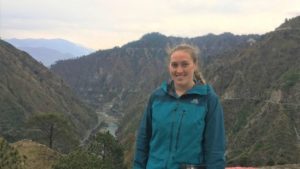
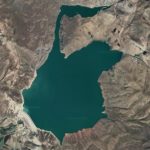

![]()
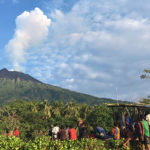
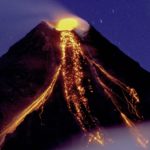

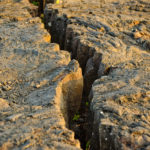
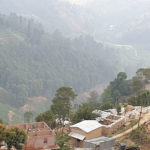
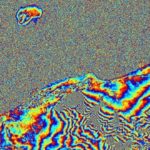
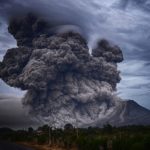
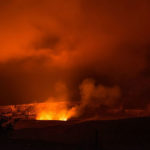
Copernicus Sentinel-1 reveals shared plumbing led to Agung awakening (Phys.org 14.02.2019) Research published in Nature by COMET researchers Dr Fabien Albino and Professor Juliet Biggs at the University of Bristol was covered by a number of media sources, such as The Express, Science Daily and Earth.com.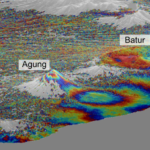
How AI can help predict volcanic eruptions (Science 11.12.2018) Andy Hooper explains how artificial intelligence can help to detect volcano deformation patterns in millions of pieces of data.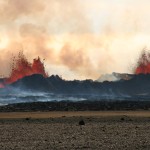
Research into deadly 2016 Italian earthquakes could improve future seismic forecasts (Phys.org 23.08.18) Work by Richard Walters and Laura Gregory has shown that the clustering of the three 2016 Italian quakes might have been caused by a cross-cutting network of underground faults.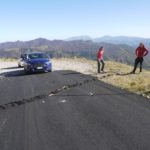
Turkish fault reveals seismic steadiness (JPL Space in Images 12.04.18) Ekbal Hussain’s work on the North Anatolian Fault in Turkey shows that tectonic strain builds up along this fault — one of the worlds most deadly earthquake zones — at a remarkably steady rate.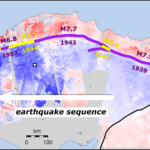
What volcanic plumes reveal about our planet (BBC R4 The Life Scientific 30.05.17) Tamsin Mather explains how her work is helping to not only predict when a volcano may erupt, but to understand how volcanoes shape our planet both now and over geological time. 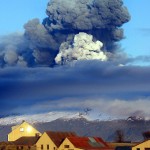
Sentinel satellites to monitor every volcano (BBC science website 19.04.17) Juliet Biggs and Andy Hooper explain how the Sentinel constellation will routinely map the planet’s surface, looking for signs that might hint at a future eruption.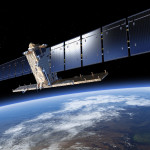
The rapidly populating coastal region from the Gulf to Pakistan faces a huge tsunami risk (The Conversation 05.04.17) Camilla Penney explains how a 1,000 km long fault at the northern end of the Arabian Sea may pose a tsunami threat. Kaikoura: Most complex quake ever studied (BBC science website 23.03.17) Tim Wright explains the mechanics behind this event which has prompted a rethink about how earthquakes are expected to behave in high-risk regions such as New Zealand.
